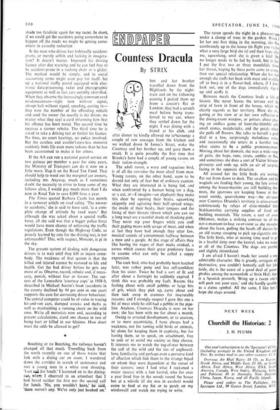Countess Dracula
By STRIX
their ration-strength. •
The adult raven, a wary and sagacious bird, is of all the corvidae the most aloof from man. Young ravens, on the other hand, seem to be devoid not only of fear but of ordinary caution. What they are interested in is being fed, and when confronted by a human being (or a dog, or a cat, or—I imagine—an elephant) they make this clear by opening their beaks, squawking exigently and agitating their half-spread wings; the inside of their beaks, their tongues and the lining of their throats (down which you can see a long way) are a tasteful shade of shocking pink. They never nip your fingers while you stuff their gaping maws with scraps of meat, and when at last they have had enough they utter low, musical sounds of contentment halfway between a mew and a gurgle. At this stage of affairs they like having the napes of their necks stroked, a caress which causes their great predatory faces to assume what can only be called a soppy expression.
The cock bird, who had probably been hatched later, was rather puny -and less self-confident than. his sister. Twice he had a sort of fit and after about a fortnight he suddenly expired. I think this was probably my fault. Ravens like fooling about with small pebbles or large bits of grit, which they pick up, carry about and then tuck away in crannies for inscrutable reasons; and I strongly suspect I gave this one a bit of meat while he still had a pebble in the pipe- line. Anyhow, Countess Dracula is now on her own; she has been with me for about a month.
Owing to arrested development, or to atavism, or to mere eccentricity, I have always had a weakness, not for taming wild birds or animals, let alone for keeping them in captivity, but for having them, so to speak, on attachment, free to seek or to avoid my society as they choose. It interests me to watch the tug-of-war between the call of the wild and the ties of cupboard- love, familiarity and perhaps even a perverse kind of affection which link them to the strange biped on whom they were dependent at the outset of their careers; once I had what I reckoned a major success with a hen kestrel, who for over a year lived free in the woods round the house but at a whistle (if she was in earshot) would come to feed at my fist or to perch on my windowsill and watch me trying to write.
The raven spends the night in a pheasant-pm under a clump of trees in the garden. When I let her out first thing in the morning, she flier cumbrously up to the house (in flight you realise what a very large bird she is) and then hops after
me, squawking, until she is given a feed. She
no longer needs to be fed by hand, but in feet I put the first two or three mouthfuls down her throat, hoping by these petits soins to streng- then our special relationship. When she has had enough she stuffs her beak with meat and waddles off to bury it in a flower-bed, where, if I don't look out, one of the dogs immediately digs it up and scoffs it.
Between meals the Countess leads a life of leisure. She never leaves the terrace and the strip of lawn in front of the house, which she clearly regards as her territory. Here she sits, gazing at the view or at her own reflection in the dining-room window, or potters about play.
ing an endless game of hunt-the-thimble with small stones, matchsticks, and the petals which she pulls off flowers. She talks to herself a good deal in a low, surprisingly melodious voice, and occasionally she utters in a harsher tone
'what seems to be a public pronouncement.
Moving about her domain, she uses a wide range of gaits; she hops, runs, struts, ambles or flies, and sometimes she does a sort of Victor Silvester pirouette and ends up, with an air of surprise, facing in the opposite direction.
All around her the little birds are working flat out from dawn to dusk. The swallow and the wagtails are feeding their young, the late arrivals among the house-martins are still building their nests, the sparrows are keeping house in their usual untidy, quarrelsome way—the air-space over Countess Dracula's territory is criss-crossed continuously by relays of civic-minded little Stakhanovites carrying supplies of food and building materials. The raven, a sort of avian Oblomov, makes a striking contrast to all this not-a-moment-to-lose va-et-vient as she mooches about the lawn, pulling the heads off daisies like an old tramp stooping to pick_ up cigarette ends.
The little birds, who at nesting time used to get in a fearful tizzy over the kestrel, take no notice at all of the, Countess. The dogs are puzzled and slightly intimidated.
I am afraid I haven't made her sound a very admirable character. She is greedy, arrogant and destructive, you couldn't honestly call her jolie bide, she is the cause of a good deal of guano• phobia among the womenfolk at Strix Hall, then is a Spanish proverb, 'Bring up a raven and it will peck out your eyes,' and she hardly qualifies as a status symbol. All the same, I like her; I hope she stays around.














































 Previous page
Previous page